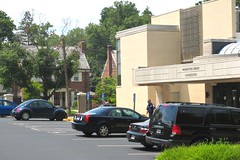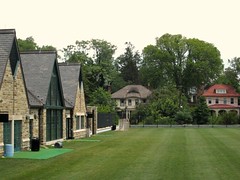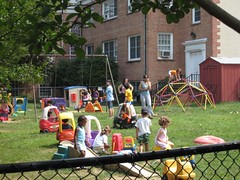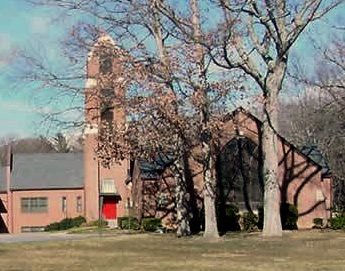Community ain't what it used to be: neighborhood challenges to churches and schools (part 1)

Posted July 2, 2008 at 1:49PM
I’ve had this post milling around in my head for a long time. What finally prompted me to write is a ferocious battle in my neighborhood challenging a Baptist church’s proposed addition to its building. The addition would house a non-profit child care center, a language school for kids, and the Washington Conservatory of Music, which the church hosts.
Sounds fine to me. But some neighbors say that wouldn’t be the end of it. They say the church has also hosted all sorts of other nefarious activities, such as meetings of Overeaters Anonymous, summer camps, a girls’ chorus, the City Choir of Washington, and even a program for “troubled youth,” according to a quote in the neighborhood newspaper. What next, the neighbors must wonder. Pot-luck suppers? Musical classes for the homeless? The traffic and people are already unbearable, goes the argument.
Maybe it’s just me, but these sound like the sorts of things that churches have always done, and our communities are better because of it. I can’t imagine this kind of ruckus being raised in my youth. (And I’m glad, since my band used to rehearse in our church’s social hall and host musical performances there.) If it meant a little more traffic or whatever, that was OK, because our community was actually proud of this stuff. And by the way, I walk, ride my bike, and drive by the Baptist church in my neighborhood all the time, at all hours of the day. I have yet to see anything remotely approaching the “constant stream of traffic” cited by the complainants. In fact, there is hardly ever any significant traffic, by city standards.
The same neighborhood paper (they call themselves "a crusader of information" and love citizens-up-in-arms stories) also has an article about a different but nearby neighborhood’s recent victory, keeping a movie theater (below left) from following through on its plans to host Sunday morning services for an evangelical church.
“Some residents worried about the traffic and parking problems” (wouldn't the theater's usual movies present the same issues?) and others, well, just didn’t like the kind of church it was. They fought the plan on zoning grounds and eventually the theater withdrew its proposal.
Again, the contrast with the way communities used to operate is striking. When I was a child, my parents belonged to a congregation that didn’t yet have a building. So we met for services on Sunday mornings at a local elementary school until the church (Groce United Methodist in Asheville, above right) was built. Again, no big deal. Today, maybe sensitivities about separation of church and state have evolved to where public school use would no longer be seen as appropriate, but I can assure you it would not have been a problem to house the services in a private building such as a commercial movie theater.
 People respected differences of religion, too. In the DC case, somehow I don’t think there would have been such strong objection if the theater had proposed, say, children’s matinees on Sunday mornings instead of evangelical church services. And, although I’m no evangelical, that rubs me the wrong way.
People respected differences of religion, too. In the DC case, somehow I don’t think there would have been such strong objection if the theater had proposed, say, children’s matinees on Sunday mornings instead of evangelical church services. And, although I’m no evangelical, that rubs me the wrong way.
(For the record, at this point I’m what some people would call a secular humanist, with a trace of Buddhism lurking around. But my church upbringing had everything to do with shaping my adult values, including the environmental ones.)
There is yet another vigorous neighborhood fight in a different part of town over a proposed two-story Mormon church, with a sanctuary that will seat 240 members, on a street that already has 45 existing churches. The 46th, opponents say, would be out of character with the neighborhood. (OK, the proposed steeple is higher than even I would prefer, but it’s still quite a bit shorter than the steeple on the church that my friends Bob and Barbara attend, on the same street a mile to the south.) And in yet another part of town, neighbors challenged the permit for a Buddhist center on Massachusetts Avenue, a street well-known for its embassies, churches and other institutional buildings, on the grounds that the facility was not a “house of worship” under the law. (They lost.)
It’s not just churches that are drawing citizens’ fire: it’s schools, too. A neighborhood in suburban Virginia is fighting expansion of a Montessori school. (Talk about a menace to society.) And the neighborhood just south of mine in DC had a protracted, bitter fight over the National Cathedral School’s new athletic facility, even though it was mostly built underground. “Oppose the Coliseum – Don’t Throw the Neighborhood to the Lions!” shouted the signs in neighborhood yards. (The National Cathedral School is operated by the Episcopal Church, and serves girls in grades 4-12. It is on the grounds of Washington National Cathedral, a 57-acre site, only 14 percent of which may be developed.)
 Do you see a coliseum in the photo? See that green space? Green space that neighbors can use? (There's a lot more of it to the right of the photo.) That’s the new gym’s roof! That one went to court, the neighbors lost, and the gym was built. The neighborhood remains green and peaceful, there has been no significant traffic increase, and property values have continued to go up, despite the downturn in housing values elsewhere.
Do you see a coliseum in the photo? See that green space? Green space that neighbors can use? (There's a lot more of it to the right of the photo.) That’s the new gym’s roof! That one went to court, the neighbors lost, and the gym was built. The neighborhood remains green and peaceful, there has been no significant traffic increase, and property values have continued to go up, despite the downturn in housing values elsewhere.
I could go on and on - there are stories of neighborhoods opposing nursing homes - nursing homes! My favorite of all these DC battles, though, is the instance about a decade ago when a tony neighborhood refused to let a charity run pass through, because it would have meant closing the street for two hours on a Sunday morning, once a year. I forget the charity, but I think it was medical – leukemia, maybe? The event had to be re-routed.
What the heck happened between my youth and now, to the point where what used to be regarded as community assets are now regarded as community threats? As my friend Merry wrote, “I've been thinking about this kind of thing a lot (neighborhoods and community, now vs. then) and feel like I am missing some key piece of the puzzle . . . as if I fell asleep for a few years (college & grad school?) and missed some major societal change that caused this.”
I’ll explore the possible reasons why in my next post: (Read part 2 here.)
Move your cursor over the images for credit information.



